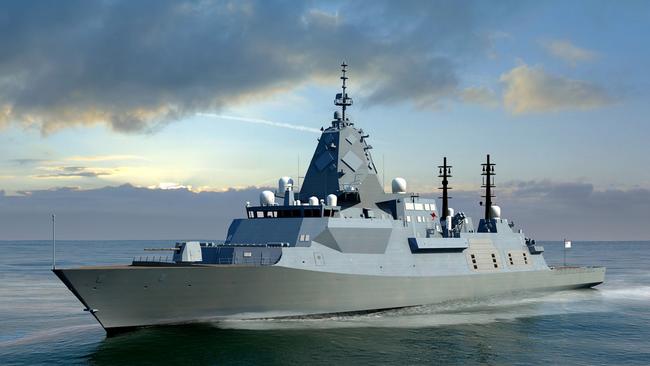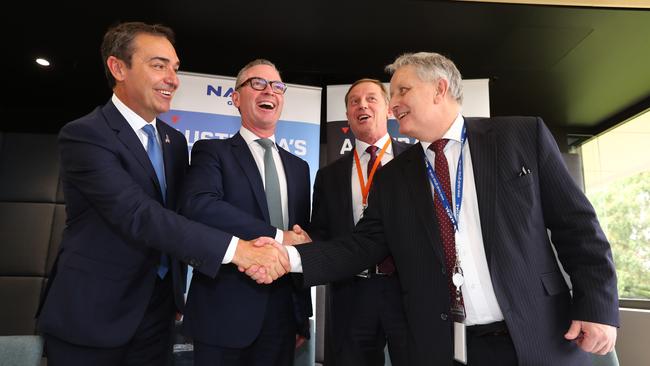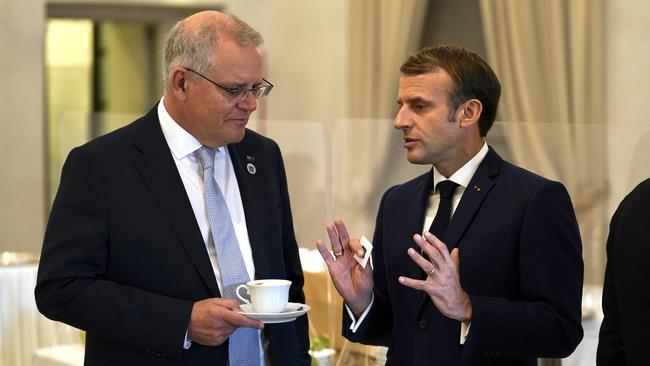Just one Australian business contracted for Hunter-class frigate work
Just one Aussie company is contracted to work on the future frigates – raising fears Defence will use British workers.
SA News
Don't miss out on the headlines from SA News. Followed categories will be added to My News.
Only one Aussie firm has been contracted to provide equipment for the future Hunter-class frigates, raising fears Defence will rely heavily on the British supply chain for the fleet.
First Assistant Secretary of Ships, Sheryl Lutz, told a senate estimates hearing fewer than 40 Australian businesses were working on the prototyping phase of the project at Osborne.
She said just one supplier with a presence in Australia had secured work on the construction of the first three ships, labelled “batch one”.
Ms Lutz said the existing British supply chain for the Royal Navy’s future Type 26 frigate, on which the Hunter-class is based, would be used for key elements initially.
Defence would then use a $600m fund to help boost local content for the second and third batches of ships.
Australian Industry Defence Network boss Brent Clark said Defence must sign up local companies including those dumped by the AUKUS submarine announcement, immediately.
“It’s going to be very difficult for Australian companies to break into the supply chain for ship four onwards,” he said.

“Given they have allocated this $600m to boosting local content, why have they not spent this today on getting Australian suppliers into batch one?”
A spokeswoman at BAE Systems, the leaders of the Hunter-class build, said they were “exceeding” contracted requirements of 62 per cent local content.
Ms Lutz said extra time had been set aside to progressively increase the local content across the life of the program.
She suggested those working on prototyping would be included in the main supply chain.
“The whole idea of prototyping is not only to look at the process for the shipyard but actually to ensure that the (businesses) that you are using can do the job, so that when you use them on production,” she said.
Ron Finlay from the Naval Shipbuilding Advisory Board, at a previous committee hearing, warned swapping from foreign suppliers in batch one to Australian suppliers in batch two would compromise performance.
Independent SA senator Rex Patrick, who was questioning Ms Lutz in senate estimates, called the frigate project a “sad story”.
“With the frigate program delayed yet again, this extra time should be used to incorporate Australian equipment into the design of the batch one ships,” he said.
The construction start date was pushed back by 18 months.
It has prompted a major defence industry lobby group to call for Defence to accelerate the acquisition of local equipment.
Revealed: What the dumped subs deal cost SA firms
Up to 350 small and medium South Australian businesses have together sunk at least $35m just getting themselves ready for work on the cancelled Attack-class submarines, industry estimates show.
The Australian Industry Defence Network estimated 175 SA companies had qualified as suppliers for the submarines, which were to be built by French company Naval Group at Osborne.
Network boss Brent Clark said each company invested on average at least $200,000 in new equipment, technology and staff just to qualify as a supplier for the $90bn program.
Mr Clark said the estimate was based on a “sliding scale” and several businesses would have spent far more than $200,000 in preparation.
The other 175 businesses were yet to qualify and many would have spent less than that figure.
“Clearly the ability for those companies to recoup their investment is pretty minimal at this stage,” Mr Clark said.
The new figures come amid an extraordinary escalation of diplomatic tensions, with French President Emmanuel Macron accusing Prime Minister Scott Morrison of lying about the decision to sign a nuclear submarine deal with Britain and the US.
Mr Clark, a former interim Naval Group Australia chief executive, called on the federal government to swiftly include the businesses in BAE System’s supply chain for the Hunter-class frigate program.

The Defence department established the Impacted SME Support Cell a month after the Attack-class contract was torn up in favour of at least eight nuclear-powered submarines under the historic AUKUS alliance.
The cell provides advice and “access to collaboration opportunities” for businesses affected by the decision.
Finance Minister and SA Senator Simon Birmingham recognised there would be many local companies that expected work on the Attack-class fleet.
“With a hive of shipbuilding activity happening right now in SA and in the decades to come, these local companies should be optimistic about their ability to secure new work and gain new contracts,” he said.
“SA companies have runs on the board when it comes supporting defence programs and there will be no shortage of opportunities for this to continue well into the future.”
Among future defence projects include the Collins-class life-of-type extension and upgrades to the Hobart-class air warfare destroyers.
Mr Morrison is facing calls to make an iron-clad promise the future nuclear-powered submarines will be built in Adelaide.
To date, Mr Morrison has only said the federal government “intends” to build the boats at Osborne.

National secretary of the Australian Manufacturing Workers’ Union, Steve Murphy, said there had been “no assurances” for shipbuilders that the fleet would be built in Australia.
“Australia has no experience with nuclear fuel cells, and no appetite to develop this technology,” he said.
Mr Murphy raised fears of another “Valley of Death” – a long gap of limited work, which he said happened in the mid 2000s between construction of the Collins-class submarines and the Hobart-class air warfare destroyers.
“The lack of apprentice recruitment during these years created a generational gap in skills that continues to cause problems to this day,” he said.
A Defence spokeswoman said the federal government was “committed to finding a role for every skilled shipbuilding worker impacted by the Attack-class decision”.
gabriel.polychronis@news.com.au





